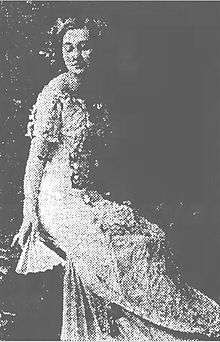Aloysius Larch-Miller
| Aloysius Larch-Miller | |
|---|---|
 Larch-Miller in 1918 | |
| Born |
September 27, 1886 Tennessee |
| Died |
February 2, 1920 (aged 33) Shawnee, Pottawatomie County, Oklahoma |
| Nationality | American |
| Other names | Aloysius Larchmiller |
| Occupation | social worker, suffragette |
| Years active | 1917-1920 |
| Notable work | debate on Ratification of the Nineteenth Amendment |
Aloysius Larch-Miller (1886-1920 also known as Aloysius Larchmiller) was a suffragette and women's rights advocate from Oklahoma. She was most known for a debate speech made days before her death which resulted in passage of a proposal to ratify the Nineteenth Amendment. She was posthumously inducted into the inaugural group of women honored by the Oklahoma Women's Hall of Fame.
Biography
Early years
Aloysius Larch-Miller was born on September 27, 1886[1] in Tennessee[2] to Ellen (née Burke)[3] and George Larch-Miller. The family moved to Oklahoma Territory after the 1900 census,[2] but prior to Larch-Miller's sister, Genevieve's marriage in 1905, taking up residence in Shawnee, Pottawatomie County.[3]
Work for Women's Suffrage
Larch-Miller became involved in the work of the Red Cross[4] during the first World War.[5] She was secretary of the county Red Cross organization and county chairman for the Third Liberty Loan. Larch-Miller worked with the Oklahoma suffrage movement, calling the first mass meeting of suffragettes in Oklahoma and served as chair of women’s petitions.[6] In 1919, she was authorized by the State Board of Education to supervise the addition of nursing training to the state normal schools.[7]
Oklahoma voters passed a suffrage bill in November 1918, prior to the vote on the federal amendment,[8] but a provision of the state law prohibited women from holding state office. When the US congress passed the voting amendment, Governor Robertson agreed to hold a special session to ratify the Nineteenth Amendment, if the women could get the attendants to come to the session at their own expense.[9] In October, 1919, Larch-Miller, who was heading the ratification committee, and a delegation of suffragists secured a majority of support and attempted to meet with the governor to have him call the special session. He refused to meet with them to accept their list of supporters.[10]
Death
In February, 1920, Larch-Miller, though sick with influenza attended a county convention debate over ratification. She succeeded in defeating her rival's arguments and secured the convention's agreement to adopt the resolution by 2 to 1 margin; however, she succumbed to her illness and died the following day.[11] She died on February 2, 1920[1] and was buried on February 3 in the St. Benedict’s Catholic Cemetery[12] (now Calvary Cemetery) at Shawnee, Pottawatomie County, Oklahoma.[1]
Legacy
Posthumously, Oklahoma ratified the Nineteenth Amendment on February 27, 1920.[13] In 1982, Larch-Miller was inducted into the Oklahoma Women's Hall of Fame as one of the inaugural inductees.[14]
References
- 1 2 3 "Pottawatomie County Oklahoma Cemeteries: 005 Calvary". Shawnee, Oklahoma: Cemetery Census. 8 May 2014. Retrieved 27 October 2015.
- 1 2 "1900 Tennessee Census". Family Search. Jackson city Ward 4, Madison County, Tennessee: Church of Jesus Christ of Latter-day Saints. 7 June 1900. Retrieved 27 October 2015.
- 1 2 "Marriage Records: T. C. Sanders to M. Genevieve Larch Miller". Family Search. Pottawatomie County, Oklahoma Territory: Church of Jesus Christ of Latter-day Saints. 11 January 1905. p. 4. Retrieved 27 October 2015.
- ↑ "Miss Aloysius Larch Miller". Muskogee, Oklahoma: The Muskogee Times-Democrat. 22 February 1919. p. 8. Retrieved 27 October 2015 – via Newspapers.com.

- ↑ "Militant, Leader In Women's Rights Cause Passes Away". Ada, Oklahoma: The Ada Weekly News. 5 February 1920. p. 5. Retrieved 27 October 2015 – via Newspapers.com.

- ↑ "One Hundred Per Cent for War and Woman Suffrage". Haskell, Oklahoma: Haskell News. 8 August 1918. p. 8. Retrieved 27 October 2015 – via Newspapers.com.

- ↑ "Red Cross Nursing May Be Permanent in State Schools". Muskogee, Oklahoma: Muskogee Times-Democrat. 23 September 1919. p. 10. Retrieved 27 October 2015 – via Newspapers.com.

- ↑ "Suffrage Has Advantage". Tulsa, Oklahoma: The Morning Tulsa Daily World. 6 November 1918. p. 1. Retrieved 27 October 2015 – via Newspapers.com.

- ↑ Owen, Penny (24 April 1994). "Women Struggle For Right to Vote". Oklahoma City, Oklahoma: NewsOK. Retrieved 27 October 2015.
- ↑ "Gov. Robertson is Narrow and Undemocratic". Beaver, Oklahoma: The Beaver Herald. 16 October 1919. p. 1. Retrieved 27 October 2015 – via Newspapers.com.

- ↑ "Tribute to Suffragist". Durant, Oklahoma: The Durant Weekly News. 17 September 1920. p. 7. Retrieved 27 October 2015 – via Newspapers.com.

- ↑ "Impressive Funeral Rites Mark Passing of Miss Larch-Miller". Ada, Oklahoma: The Ada Weekly News. 5 February 1920. p. 8. Retrieved 27 October 2015 – via Newspapers.com.

- ↑ Pietrusza 2009, p. 166.
- ↑ "Women's Day Saturday at Okla. state capitol". Paris, Texas: The Paris News. 30 September 1982. p. 6. Retrieved 27 October 2015 – via Newspapers.com.

Sources
- Pietrusza, David (2009). 1920: The Year of the Six Presidents. New York: Basic Books. ISBN 978-0-7867-3213-5.